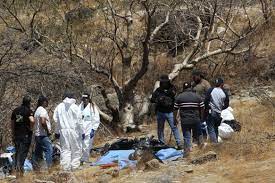As many as eight young employees who appeared to have attempted to leave their positions at a contact center run by a dangerous drug cartel that preyed on Americans in a real estate fraud were verified dead on Tuesday in Mexico.
The terrible tale that came to light late last month after the youths’ families reported them missing after they failed to show up after work at an office close to the western city of Guadalajara was corroborated by U.S. and Mexican authorities. When piles of dismembered body parts were discovered last week in plastic bags, suspicions increased.
In a statement released on Monday, forensic investigators in the western state of Jalisco stated that testing had established the bodies belonged to the missing contact center employees.
Six males and two women in all were reported missing between May 20 and May 22, although the number of confirmed identities was not disclosed by the forensic investigators. If one of the kids was among the bodies discovered, there had been some uncertainty.
Although the parents thought their children were employed at a typical contact center, the Jalisco New Generation cartel, Mexico’s most dangerous group, actually controlled the office. Beyond its core operations of drug trafficking, extortion, and kidnapping, the cartel has expanded.
Officials revealed that the cartel now runs contact centers that defraud Americans and Canadians out of money by pretending to be interested in buying their timeshares.
Officials from Jalisco have not given a reason for why the workers, all of them were under 30 with the exception of two, were killed. However, a U.S. official who spoke on the condition of anonymity, because he was not authorized to publicly discuss the matter claimed that it looked like the young people were murdered by the Jalisco cartel after they attempted to resign from their jobs.
The U.S. official said: “Best guess is these kids had decided they wanted out of the business,” adding that the cartel was “sending a message to other defectors.”
The official continued, “It appears that this has happened before.”
The CJNG, the initials of the Jalisco cartel, is well-known for its brutal punishment of alleged traitors, informers, and turncoats. It appears to be an unwritten rule for individuals who have cooperated with the cartel, whether intentionally or innocently, that the only way out is through death or imprisonment.
Out of a total of over 112,000 missing individuals countrywide, an advocacy group for families of the lost called “Por Amor an Ellxs” (roughly, “For Love of Them”) claimed that Jalisco alone accounts for about 15,000 of the missing.
For young people or migrants who may have acquired English in the United States but have returned to Mexico, call centers are a significant source of work.
When the U.S. Treasury Department announced sanctions against Jalisco New Generation cartel members or associates who allegedly ran a similar operation in the Pacific coast resort of Puerto Vallarta, also found in the gang’s home state of Jalisco, the timeshare fraud came to light in April.
The CJNG’s extensive involvement in timeshare fraud in the Puerto Vallarta area and elsewhere, which frequently targets elderly U.S. citizens and can defraud victims of their life savings, is an important revenue stream supporting the group’s overall criminal enterprise, according to Brian E. Nelson, the U.S. undersecretary of the treasury for terrorism and financial intelligence.
People looking to sell timeshares in Puerto Vallarta properties were contacted by the con artists.
In a 2023 alert, the FBI stated that scammers had contacted sellers through email and claimed to have a buyer lined up, but that the seller needed to pay taxes or other fees in order for the deal to proceed. It appears that the deals fell through after the money was exchanged.
According to an FBI study, in 2022, the Internet Crime Complaint Center of the organization “received over 600 complaints with losses of approximately $39.6 million from victims contacted by scammers regarding timeshares owned in Mexico.”
Two victims who were allegedly targeted by the fraud sought Ryan Donner, a broker at Ryan Donner & Associates, a real estate company in Puerto Vallarta, for help during the past two years.
“It happens occasionally, but yes, we have,” said Donner, who was able to warn both of them off of the con before they parted with any money.
Donner called the deception extremely well-rehearsed.
According to him, con artists emailed prospective sellers phony contracts and official-looking paperwork purporting to be from the Mexican tax office that purportedly stated taxes were owed on the proposed transaction.
It would be simple to fall into the trap of paying them since they have contracts and documentation that look to be official documents, according to Donner.
“If a company contacts someone to say that they have a buyer for a property and all they need is money, that is a huge red flag for it being some sort of scam,” said Donner. That’s not how businesses operate typically.

















